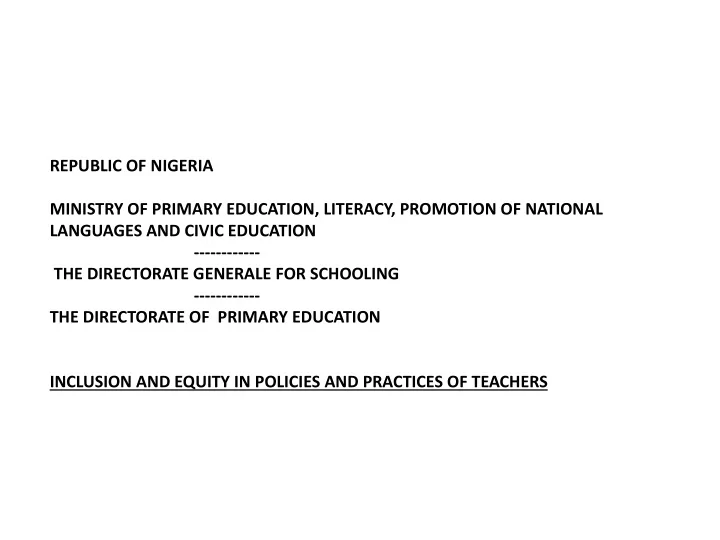

REPUBLIC OF NIGERIA MINISTRY OF PRIMARY EDUCATION, LITERACY, PROMOTION OF NATIONAL LANGUAGES AND CIVIC EDUCATION ------------ THE DIRECTORATE GENERALE FOR SCHOOLING ------------ THE DIRECTORATE OF PRIMARY EDUCATION INCLUSION AND EQUITY IN POLICIES AND PRACTICES OF TEACHERS
In Nigeria, all Governments who have succeeded one another have considered education one of their priorities. However, education in its global and inclusive aspect, that is to say, including children with disabilities was effective only starting from 1998 upon the enactment of the Outline Act on the Education System of Nigeria. Nevertheless, in spite of the introduction of this law and all the efforts made subsequently by the State and its partners about inclusion and equity in the policies and practices in the fields of teaching/learning, the situation remains serious. In fact, the housing capacities of special education schools is, on the one hand, much lower than the demand and, on the other hand, the content of the curriculums delivered do not satisfy the expectation of disabled learners as well as of those with special needs.
In addition to these difficulties, it is worth noting the serious training needs of teachers in inclusive education in order to know how to deal with the children with disabilities or those with special needs, notably, the learning disabled children or those living in remote areas or in dispersed villages, SIDA affected children, those born to refugees or displaced persons, Talibé children, street children or else). With the support of its partners, the Government of Nigeria seeks to create optimal conditions for the schooling of such school age children through multiple and cross cutting approaches. For the case of the children with disabilities, who constitute a significant part of the disadvantaged or vulnerable children, the Ministry of Primary Education, Literacy, Promotion of the National Languages and Civic Education drafted and validated the SNEEH (the National Strategy for Handicapped Children Education), a text that is under adoption.
Hence, based on the analysis of the schooling situation of the disabled children, three (3) guidelines have been adopted: To create synergy between the special, the integrated and the inclusive approaches; To ensure coordination between the different education bodies; To guarantee cross-cutting and multi-sector approach The National Strategy for the Education of Disabled Children intends to manage a number of challenges, including those related to: The access and accessibility to schools and education materials; The training of teachers who are overwhelmingly neither trained, nor prepared to receive in the ordinary classroom children with special needs; The integration of the inclusive education module in the teachers training curriculums ENI, ENS, etc.) ; Diagnosis/orientation and monitoring; The evaluation of mindsets in our society in order to develop a school more inclusive and more open that takes into account the differences and creates links between the learners.
Additionally, in the Education and Training Sector Program (PSEF), which is a sub-set of the Economic and Social Development Program (PDES), more particularly of its education and training component, the Government undertakes to promote Inclusive Education. This approach of inclusive education aims not only to promote the education of disabled children and of students coming from disadvantaged rural areas, but also to efficiently meet the individual needs of all students in the fields of teaching/learning. As we can see, inclusion and equity are at the core of the political concerns of the Ministry of Primary Education, Literacy, Promotion of National Languages, and Civic Education because they are a prerequisite for Education for all (EFA). To attain this, this ministry promotes inclusive education strategy in collaboration with partners such as UNICEF, Handicap International, Plan Niger, ODI Niger, etc., who all share the same concerns about disabled children with regards to the issue of inclusion.
This inclusion is conducted by a process called School Integration Device (DIS), which includes six (6) phases: Identification of children with disabilities; Medical and social diagnosis of children with signs of disabilities; Raising awareness of stakeholders (students, peers, parents, teachers, coaches, authorities, specialists .........); Training stakeholders; Counseling on education matters; Accessibility; Academic and social monitoring; Hence, inclusion creates the conditions for a successful school integration and, consequently, for a good teacher/learning for all children. Then, we may, without risk of error, assert that it participates in the equity and quality of the teaching practices and can be a virtuous approach to the problems of education in our country. GENDER ISSUE A national strategy for promoting the education of girls and a policy for accelerating literacy including women is under approval.
Recommend
More recommend